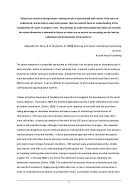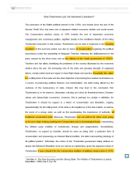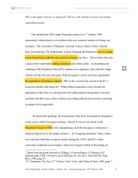Has Neofunctionalism Been Superseded By A New 'Liberal Intergovernmentalism" As Currently The Most Convincing Theoretical Explanation of European Political Integration?
Has Neofunctionalism Been Superseded By A New 'Liberal Intergovernmentalism" As Currently The Most Convincing Theoretical Explanation of European Political Integration? From an ambitious project originally envisaged to remove the catastrophe of war from such a war-torn continent, the European project has proceeded in 'fits and starts'. Since its inception, there has been much debate regarding what forces drive the integration process forward. Why now, when interstate war in Europe seems impossible, do member states continue to 'pool' their sovereignty in so many areas? Two theories have dominated previous attempts to answer the question of "how and why states cease to be wholly sovereign, how and why they voluntarily mingle, merge and mix with their neighbours, so as to lose the factual attributes of sovereignty."1 Neofunctionalism, the idea that the integration process, once started, develops its own momentum for further integration, saw the height of popularity in the 1960s, following the initial success of the ECSC/EEC and the hugely influential theoretical explanation by Ernst Haas. The second theory, Liberal Intergovernmentalism, surfaced in the 1990s and was championed by Andrew Moravcsik. It saw flaws in neofunctionalist thinking and instead offered an alternative account in which the integrative process was always, and remains, in the hands of national governments;
Critically assess Rhodes' (1997) argument that 'Policy networks of resource dependent organisations are a characteristic of the British policy process.'
Richard Swann Critically assess Rhodes' (1997) argument that 'Policy networks of resource dependent organisations are a characteristic of the British policy process.' Policy networks first emerged in the early 1980's. The origins of the theory were constructed by Richardson and Jordan however it was the work of Professor Rod Rhodes that moved the theory and our understanding of it on. Rhodes (1997) argument that, "policy networks of resource dependent organisations are a characteristic of the British political system," was one of his core themes in his book Understanding Governance. Despite the fact that Rhodes has written extensively on this area it is still debatable to what extent this statement is true. In an effort to assess Rhodes argument as well as considering the usefulness of the policy network approach I will examine it in the context of a policy area. My chosen case study is the internal market in health focusing on the G.P. fund holding scheme. For the purpose of looking at the relevance of Rhodes argument in the contexts of the policy process in this area I will evaluate policy networks activities from the 1991 Conservative reforms till the present New Labour government. The policy process in Britain in resent years can best be described as complex and hard to define. In British politics policy is not constructed in one single area, the policy process is not
Social Work Values. Values and ethics have been of fundamental importance throughout the development of the social work profession.
“Values are central to being human: nothing we do is unconnected with values. If we want to understand, and be able to work with people, then we need to have an understanding of the complexities of values in people’s lives. Any attempt to understand people that does not consider the values dimension is doomed to failure as values are so central to everything we do, both as individuals and professional social workers.” Adapted from: Moss, B. & Thompson, N. (2008) Meaning and Values: developing empowering practice. Russell House Publishing The above statement is essentially saying that an individual’s set of values play an imperative part in every decision, action or behaviour in their everyday lives. A person’s value system can be made up of personal, ethical, cultural or political vales. Along with their own personal values, social workers must also adhere to a strict set of professional values outlined by the General Social Care Council’s (GSCC) codes of conduct. It can be difficult for a practitioner to find a balance between these often conflicting and opposing value systems. Values and ethics have been of fundamental importance throughout the development of the social work profession. Founded in 1869, the Charity Organisation Society is often identified as the roots of modern social work. (Smith, 2002) It was set up in response to the belief that
Issues relating to adults with a physical disability. This assignment aims to explore physical disability, specifically focusing on issues relating to adults with spinal cord injury.
Introduction This assignment aims to explore physical disability, specifically focusing on issues relating to adults with spinal cord injury. Spinal cord injury is any injury to the vertebrae causing damage to the nerve tracts resulting in variable degrees of paralysis. It is more prevalent amongst males aged between 15 and 30 years and is a major cause of serious disability (Royle and Walsh, 1992). I will divide the assignment into the following sections; - medical and social model approaches - core professional skills - empowerment and advocacy It is important to define impairment and disability from a social model perspective because this will be the meaning I will adopt for this assignment. According to the Physically Impaired Against Segregation (UPIAS) (1976); impairment means to lack all or a part of a limb or having a defective organ, limb or mechanism of the body. Disability is defined as the restriction of activity or disadvantage caused by physical and social barriers resulting in societal discrimination and oppression. In 2003, 6.9 million or nearly one in five people in the UK were registered disabled (Shaw, 2006). Worryingly, Nelson and Shardlow (2005) reported that disabled people are more likely to experience abuse then the rest of the population. These facts demonstrate the paramountcy of the social worker's role providing support, assistance and
Examine an area of oppression and discuss how this manifests itself in institutions and societies and how it impacts upon the lives of individuals and communities.
Examine an area of oppression and discuss how this manifests itself in institutions and societies and how it impacts upon the lives of individuals and communities. This essay will examine disability as an area of oppression in society. When answering this question it would be useful, first of all to put forward a definition for the term disability. The Disability Discrimination Act (1995) describes disability as 'a physical or mental impairment which has a substantial and long-term adverse effect on his or her ability to carry out normal day to day activities'. In Northern Ireland there are an estimated 201,000 Disabled Adults (Working with Diversity). Despite this high number, people with disabilities are treated as a separate homogenous group to the rest of society. I will examine how this oppression has manifested itself through institutions by drawing on the medical and the social model of disability. The medical model of disability is seen as being a discriminatory perspective that perceives disability as a personal tragedy. In contrast, Thompson (2006) regards the social model of disability as being an anti-discriminatory perspective that requires a change in how we view disability. Thompson (2006) refers to disablism as 'the systematic discrimination and prejudice against people with disabilities which produces a milieu of oppression and degradation' (p.122). Lack of
Inter-professional Practice and Safeguarding Children
20042188 CYCC52 Inter-professional Practice and Safeguarding Children CYCC52 Inter-professional Practice and Safeguarding Children Different professional groups may each have their own priorities when it comes to safeguarding children. Giving examples of these, discuss whether it is possible for professionals to work together with the interests of the child to the fore. Essay: 60% of module mark, 2500 words, learning outcomes 1 & 3. First and foremost during this essay I will examine what inter-professional practice is and where it has come from. Furthermore I will analyse the different ways in which the agencies that I work alongside work together to help safeguard children and young people. I will discuss the priorities that they may have using examples which I have been involved in within my setting. I will then discuss whether it is possible to work solely child centred when it comes to safeguarding and analyse the difficulties we may come across while attempting this, mainly focussing on budget restraints and how they affect the young people we provide a service for. I will briefly divulge into the tragedies of both Victoria Climbie and ‘Baby P’ discussing why inter-professional practice was not successful. And finally I will discuss ways in which I believe inter professional practice could be improved across the board by introducing reviewing
This assignment will focus on the characteristics of the social and medical model of mental illness. The assignment will demonstrate professional judgement, accountability of a social worker and statutory requirements of protection and intervention for a
Assessment 2. Using the directed reading and other appropriate literature and research, compare and contrast the medical and social model of mental health and mental disorder. Critically evaluate how the identified reading and other literature can inform a social work practitioner's understanding and practice. This assignment will focus on the characteristics of the social and medical model of mental illness. This assignment will demonstrate an understanding of how adults and cares experience mental health and social problems. The assignment will demonstrate professional judgement, accountability of a social worker and statutory requirements of protection and intervention for a social worker working with people who are suffering from a mental illness. According to Golightley (2004) there are several theories about mental disorder but the two main theories are the medical and non-medical models. The medical model or disease model has been the dominant model of mental disorder from around 150 years ago when the state employed the medical profession to manage and treat mental disorder (Golightley 2004). The medical model views mental disorder as a physical illness, which can be medically treated in a medical institution (Beech 1991). Beresford (2002) pointed out that 'this approach is based on a deficit model that presumes health problems primarily arise from within the
Was Thatcherism just 'old-fashioned' Liberalism?
Was Thatcherism just 'old-fashioned' Liberalism? The panorama of the British political domain in the 1970s, and indeed since the end of the Second World War, has been one of apparent relative economic decline and social unrest. The Conservative election victory of 1979 marked the end of Keynesian economic management and consensus politics, signified clearly in the neoliberal rhetoric of the rising Thatcherite movement. In this context, Thatcherism can be seen in response to the 'creeping socialism' of the post-war period, but also in terms of Conservatism regaining the political ascendancy under the leadership of Margaret Thatcher, following the disillusionment in the party caused by the what many saw as the failures of the Heath government of 1970-74. Thatcher and her allies, identifying the problems of the country illustrated by the economic decline since the war, the increasing role of the state and growing strength of organized labour, merely added zeal and vigour to New Right ideals and practice. Essentially this called for a rolling back of the state and the clear objective of promoting free market mechanisms as a means of preserving political freedom and individualism, the latter being diluted by the vastness of the bureaucracy of state. Indeed, this may lead to the conclusion that Thatcherism is, in its essence, Libertarian, echoing as it does (in theoretical terms)
How presidential is the premiership of Tony Blair.
HOW PRESIDENTIAL IS THE PREMIERSHIP OF TONY BLAIR? INTRODUCTION AND CONTEXT The traditional view of the UK's constitutional arrangement of power in government has been that decision making in the executive rests with the cabinet, with the Prime Minister acting as "first amongst equals". However, this has been challenged by many recently, who argue Margaret Thatcher in particular challenged and now Tony Blair has almost eliminated cabinet government, and is the most powerful Prime Minister in the modern era. Some have claimed that Blair is now more of a Presidential figure than a Prime Minister working within the context of cabinet government, in that he exercises personal control over the executive branch and we have an executive decision and policy making process based on an individual rather than a collective body. Obviously there are some major differences between a Presidential system of government and the current British system. In the US, which is Presidential, you vote directly for who you want to become President. In Britain, you are voting for an individual who will become an MP in the Commons. The public has no direct say over who becomes PM; they have been chosen internally within the particular party. However, exit polls from the 2001 British general election do suggest that voters are increasingly influenced by the personalities of the party leaders1. During
What evidence is there that the state is still the dominant actor in World Politics?
What evidence is there that the state is still the dominant actor in World Politics? For some 300 years from its emergence in the mid seventeenth century the state - in the specific form of the nation state - was rightly regarded as the dominant actor in international economic relationships. (Dicken; 1998, pp 79) One of the most prominent features of the global political system in the second half of the twentieth century is the significant surge in numbers and importance of non state entities. The rise of these transnationally organised non state actors (NSA) and their growing involvement in world politics challenge the assumptions of traditional approaches to international relations which assume that states are the only important units of the international system. This essay plans to analyse the extent of the states dominance in the sphere of world politics. The analysis of NSA influence and the states gradually decreasing dominance shall be explored with reference to two vastly different schools of thought. The first school of thought to be examined is that of 'realism' where a state-centric approach is adopted. The second school of thought to be considered is that of a complex interdependence system where NSA enjoy an almost equal pegging to that of states in the field of international relations. This essay shall refer to and question amongst other things, the growing
























